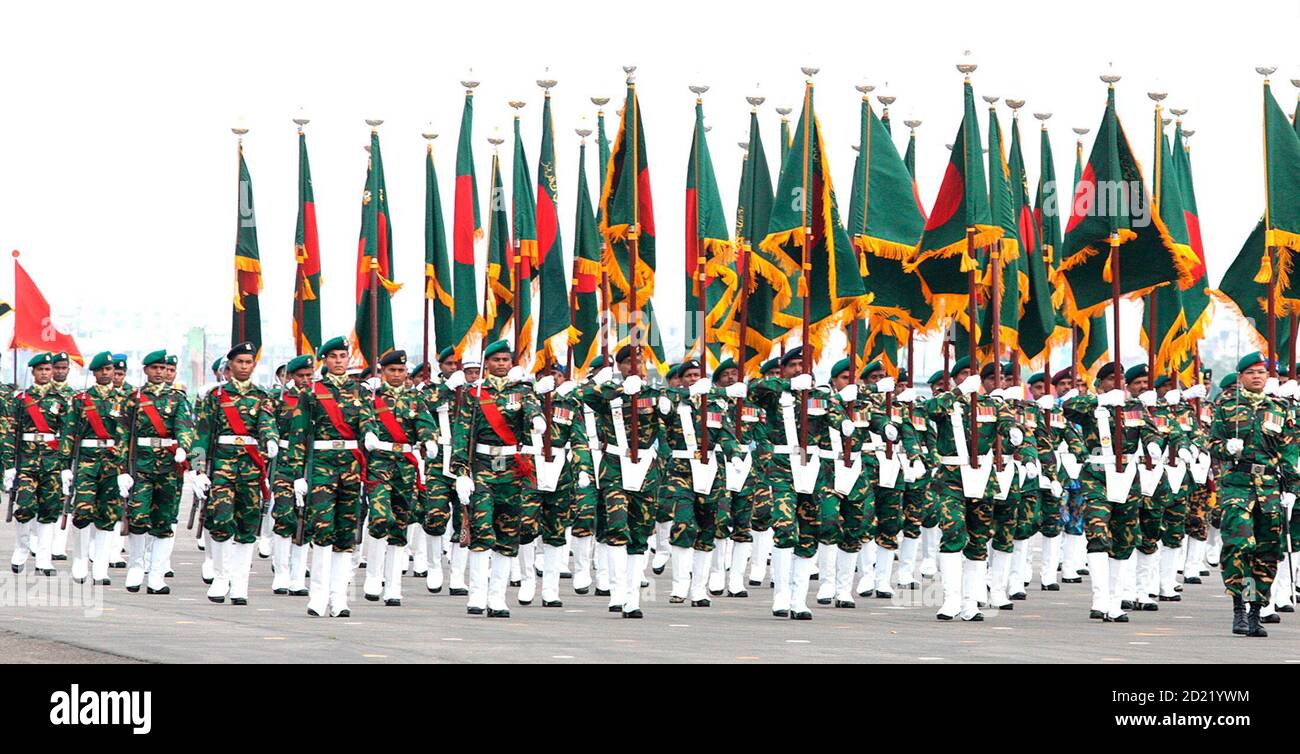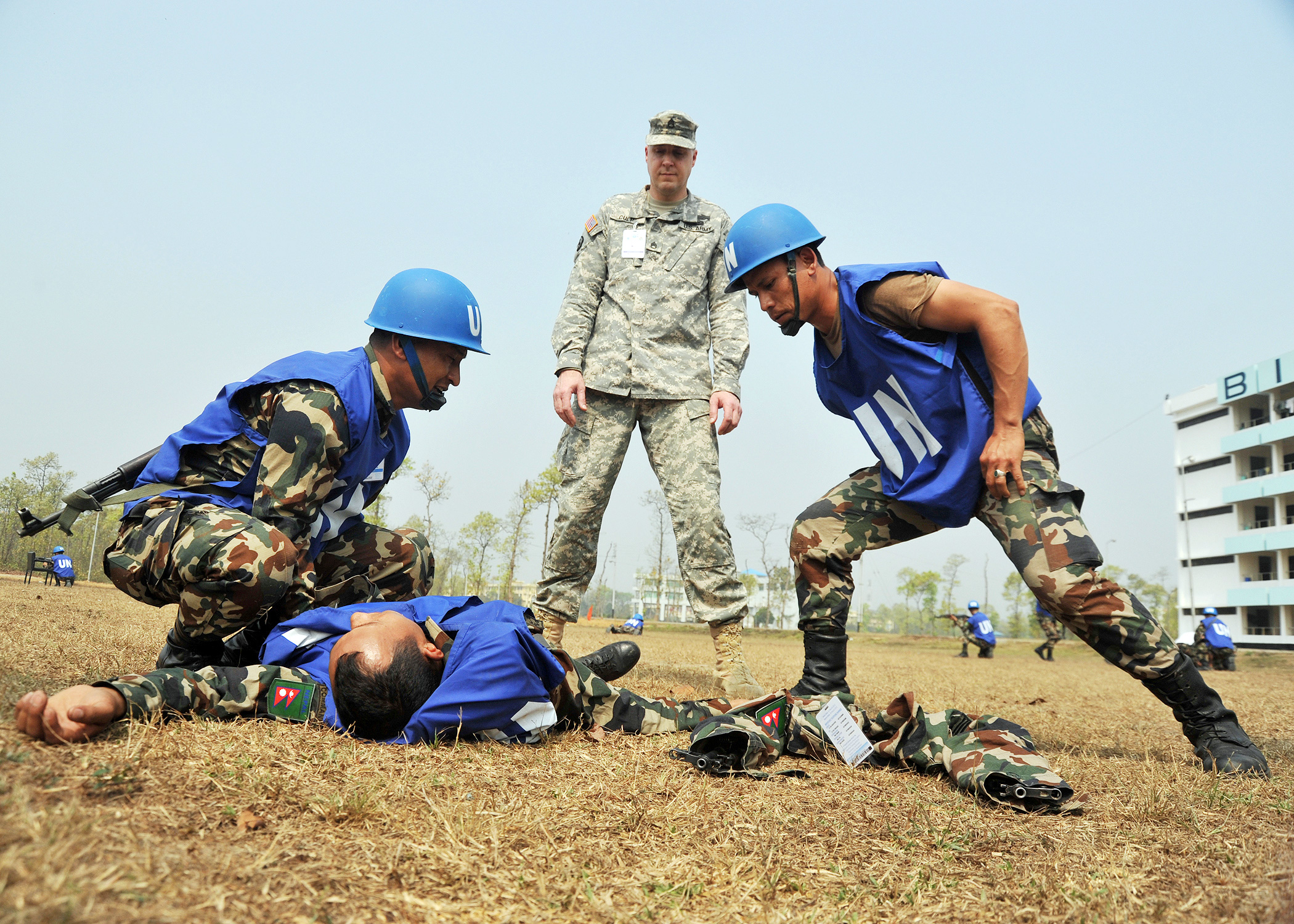Bangladesh Military Power - The United Nations has called for a full investigation into evidence of corruption and crimes involving the Bangladeshi army, revealed in an investigation released by Al Jazeera on Monday.
Bangladeshi army chief General Aziz Ahmed, who is due to meet senior UN officials in New York next week, has been implicated in corruption.
Bangladesh Military Power

The Al Jazeera Investigative Unit has revealed that the Bangladeshi army has bought advanced and highly intrusive mobile phone surveillance equipment from Israel, which the Bangladeshi military commander said "for one of the military contingents to be deployed in the UN peacekeeping mission".
File:bangladesh Army Female Contingent. (31566615061).jpg
"Such equipment has not been shared with the Bangladeshi contingent in UN peacekeeping operations," a UN spokesperson told Al Jazeera.
"We are aware of the Al Jazeera Investigations report and the press release issued by the Bangladesh Ministry of Defense regarding allegations of corruption against senior officials in Bangladesh. Alleged corruption is a serious matter and should be investigated by the relevant authorities.
Bangladesh is the contributor of all uniformed personnel for UN peacekeeping operations, with more than 6,800 currently deployed in peacekeeping operations around the world.
The surveillance tool is called "International Mobile Subscriber Identity-Catcher" or IMSI-Catcher. This is a device that simulates a cell tower to trick a mobile device into providing the location and data obtained by the device.
Bangladesh Armed Forces Create History On Delhi's Rajpath
Bangladesh's army said the device was manufactured in Hungary, not Israel, which the Muslim-majority country does not recognize.
Al Jazeera secured the purchase agreement, which deliberately hid the fact that Pixix, the manufacturer, was an Israeli company. PicSix was founded by a former Israeli intelligence agent, and Bangladesh's military intelligence service, the Directorate General of Force Intelligence (DGFI), sent two experts to Hungary to train officers on how to operate the equipment.
The contract, dated June 2018, was signed by the Directorate General of Defense Procurement, which is tasked with providing military supplies to Bangladesh. The manufacturer is called PicSix Hungary, which does not exist according to Hungarian company filings.

Al Jazeera obtained confidential recordings from whistleblower James Moloney, who claimed that the IMSI-catcher was Israeli-made. Moloney, an Irish national, owns a company called Sovereign Systems which is registered in Singapore, although he is based in Bangkok.
Myanmar Military Power
Moloney said Sovereign Systems is the business front for Pixix in Asia. He claims that the surveillance technology is from Israel, so we don't advertise that technology. We are very careful about our public profile.
He called the technology "very invasive and intrusive. You don't want people to know you're using that device.
According to Elliott Bendinelli of Privacy International, a UK-based privacy watchdog, authorities could use it to collect information about people attending demonstrations.
"You see everyone in the area and you can continue to investigate and put more people under surveillance at the same time," Bendinelli said.
Ex Sampriti Ix: Ninth Edition Of The Indo Bangladesh Joint Military Exercise Underway
Bendinelli added, "If you know what people are saying, where they are going to meet, what they are going to do, you can learn a lot. Then you are empowered to act."
Israeli human rights lawyer Etay Mack told Al Jazeera that the Israeli government does not review the human rights records of end users. "For a country like Bangladesh, if they buy this equipment from the United States or the European Union, they have influence over you when you use it to violate human rights and they can cancel the deal," he said.
The knowledge that Israeli-made spyware could be used by Bangladesh to monitor opposition groups has reignited concerns in a nation accused of multiple human rights abuses.
According to Amnesty International, the government is involved in "extrajudicial killings and disappearances, arbitrary arrest and detention and torture".
Un Calls For Bangladesh Army Probe After Al Jazeera Investigation
General Aziz Ahmed and his fugitive brother Harris attend Aziz's son's wedding in Dhaka 2019. [Al Jazeera]
Army Chief General Aziz Ahmed helped two brothers escape prison for murder and ordered officials to help him create a false identity to flee to Europe, months of secret reports revealed.
Aziz moved his fugitive brother Haris Ahmed to Hungary, where he would operate under a false identity, buy companies and property using kickbacks from military contracts, and run an extortion racket with Bangladeshi security forces. The second brother ran away to hide in Malaysia.
General Ahmed is currently on a diplomatic visit to the United States, where he will meet with UN officials to discuss the current deployment of 6,000 Bangladeshi troops for the UN in countries such as Sudan, the Democratic Republic of Congo, Liberia and Burundi. Aziz will also meet the Secretary General for Peacekeeping Operations and other senior UN officials involved in peacekeeping operations.
Bangladesh Names Sm Shafiuddin Ahmed As New Head Of Armed Forces
The United Nations, whose military personnel are known as the Blue Helmets, spends about $7 billion annually on its peacekeeping operations.
The Bangladesh deployment generated significant funding for the Bangladesh Army and was hailed as a sign of its international status as a professional military force.
Concerns raised by the United Nations will put more pressure on Bangladesh's defense ministry, which has so far defended General Aziz, who has yet to comment on the investigation. The Bangladesh Army's Public Relations Office described the investigation as "complicated and lacking in detail". "In war, in peace, we are everywhere for our nation"
The Bangladesh Army (BD Army, BA) is the land warfare branch and largest unit of the Bangladesh Armed Forces. The Army's primary mission is to provide the forces and capabilities necessary to deliver the security and defense strategy of the Government of Bangladesh and protect the nation's territorial integrity from external attacks. Staffing and operational control is maintained by Army Headquarters, Dhaka.
File:resting Iron Bangladesh Army Mt Lb Apc. (36251501343).jpg
The Bangladesh Army is constitutionally obliged to assist the government and its civil institutions during national emergencies. This additional role is generally known as "Civil Administration Assistance".
The Bgal martial tradition is rooted in the army of kings and chiefs known as Sapati or Mahasapati. The army consists of infantry, cavalry, war elephants and warships. The arrival of Muslims and the establishment of the Baghal Sultanate strengthened the military. Sultan has a disciplined army organized well. Cannons and cannons were introduced to the Beagle during the Mughal rule.
During the British colonial rule, Bengal was the bastion of British power and trade mainly in the South Asian region. The British under Robert Clive defeated the 50,000 strong Beagle army of Nawab Siraj-ud-Daulah at Palashi (Plassey) in 1757 and then the forces of Nawab Mir Qasim at the Battle of Buxar in 1764. The Beagle Army was formed. , which later became part of the British Indian Army from 1895 to 1947. The eastern part of British India was an important location for military and police recruitment, with tire horse-mounted cavalry and lancer units being recruited before the Beagle Sepoy. Rebellion of 1857.
After the Mutiny, units with the suffix "Bgal" in their names, such as the Bgal Sappers and Bgal Cavalry, were recruited mostly from non-Bgalis from Bihar, Varanasi and Uttar Pradesh, which were technically still part of the Bgal Presidency. at that time.
Bangladeshi Chief Of Army Staff Visits Unmiss, Meets Peacekeepers In Wau And Juba
During World War I, a Bengali platoon was formed to recruit soldiers from Bagal. In 1916, the British government formed Bagali Double Company. Soldiers were trained in Karachi and sent to Baghdad. He fought in the war and after the war helped put down the Kurdish rebellion in 1919.
During the Second World War, the Eastern Command of the British Armed Forces formed an auxiliary force, part engineer and part infantry, called the Indian Pioneer Corps. Most of the soldiers were recruited from West and East Beagle. This force assisted the main war effort by building roads, airfields, fortifications and, if necessary, fighting the Japanese in an infantry role. The force is organized into company groups attached to various regiments of the Indian Army in a direct support role. Captain Abdul Ghani was a company commander on the Burma front and led his troops in battle. After the war the pioneering troops were ensconced in Jalna, India, demobilized and awaiting repatriation. In 1946 Captain Ghani, Adjutant 1 and Quartermaster of Indian Pioneer Corps Citre in Jalna conceived and conceived the idea to form an infantry regiment from pioneer soldiers who were demobilized from Beagle East to Commander Citre and returned home. After receiving permission from Pakistan's Chief of Army Staff, General Sir Frank Messervi, he organized his men to form the nucleus of an infantry unit called the Bengali Paltan (Platoon).
During the creation of Pakistan, Ghani got approval from the newly appointed Commander of the Pakistan Army, General Messervey, that the East Baghal regiment was created only from East Baghal, which would be East Pakistan. On August 17, 1947, General Messervey, while saying goodbye to the Pioneer Corps soldiers from Bombay, rejected Captain Ghani's opinion and said that you will prove it to the world.
Military drone range, laser range finder military, military range bags, military range targets, long range military radio, military radio range, military range finder, military long range binoculars, range rover military discount, military range rover, range of military drones, military range bag


0 Comments